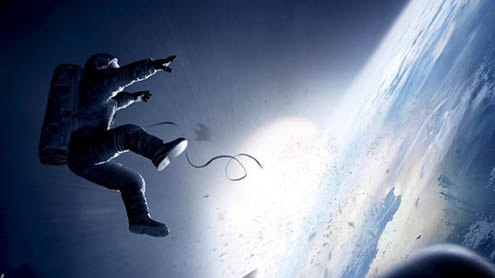It's little wonder: Cuarón has a history of injecting new life into places that Hollywood has long since rendered formulaic. His thoughtful, human Harry Potter and the Prisoner of Azkaban (2004) remains the series' most artful entry, a risky move after the first two films played safe and made millions. Children of Men (2006) reinvigorated the post-apocalyptic thriller, featuring raw, uncomfortable scenes where one camera would linger on characters for minutes at a time without a single cut—a far cry from the flashy, computerized wizardry of contemporary films like Steven Spielberg's War of the Worlds (2005).
In fairness, Gravity is more thoroughly computerized than any Spielberg film: beyond the actors' faces, nearly everything is artificially rendered. Paradoxically, however, Gravity often seems made for the stage instead of the silver screen. The tiny cast (only three on-screen roles) and short runtime (91 minutes) are both typical of an afternoon at a London theatre. So too is the progression of time: Gravity covers precisely 91 minutes of Ryan's life, giving the film a surprising sense of immediacy. Most of all, however, it's Cuarón's acute awareness of physical space that most mirrors theatrical performance. Just as a stage director must consider the entire venue (How can I make sure this scene will work for audience members both in the balcony and front row? Where should my actors enter, walk, and exit?) so too does Cuarón play intentionally with his setting. At the outset of Gravity, the camera slowly spirals around a space station, Matt's figure floating into the frame briefly, then out again. We see a second astronaut bouncing around in the distant background. Finally, we settle on Ryan, though the camera never quite frames her perfectly. The setting is unapologetically outer space, and the actors merely participants in something vastly larger than themselves. It's an electrifying choice: vulnerable, ominous, oddly suffocating and frequently terrifying.
While the visual elements have received universal praise, some have criticized the script's simplicity: a story about loss made small by basic dialogue and over-obvious metaphors. Indeed, there's nothing complicated about Gravity's plot, but I think it's just the plot a film like this requires. I will remember Gravity most for its moments of quiet human panic, for its eerie silences, and for its gorgeous depiction of an outer space as frightening as it is peaceful. Sometimes nothing more needs to be said.


 RSS Feed
RSS Feed
